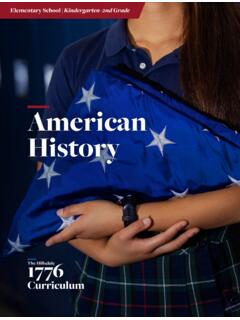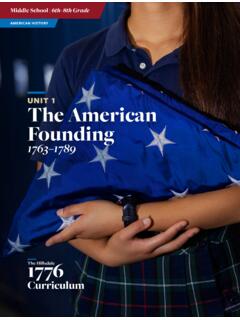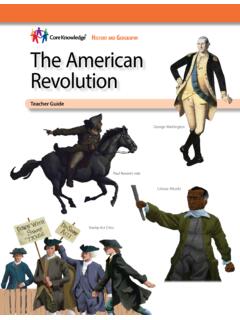Transcription of Road to Revolution
1 Lesson Plan #1 road to Revolution Introduction: In this lesson students will look at the events leading up to the American Revolution . Students will not only focus on the colonists side of the argument, but they will also be asked to interpret and understand the British side as well. Finally, students will be able to create a timeline of the events. Objectives: Content/Knowledge: 1. Students will be able to interpret the arguments for both the British and colonists on taxation 2. Students will be able to compare and contrast viewpoints pertaining to the boston massacre 3. Students will be able to describe the different Acts imposed by the British on the colonists Process/Skills: 1. Students will be able to create a timeline of the events leading up to the civil war 2.
2 Students will be able to take comprehensive and detailed notes based off of a power point presentation 3. Students will be able to work cooperatively in groups to formulate and argument 4. Students will be able to debate in a civil and respectful manner Values/Dispositions: 1. Students will be able to form an opinion on why or why not the British were justified in imposing the different taxes upon the colonists Standards: State Illinois Learning Standards 1. Compare competing historical interpretations of an event. 2. Analyze and report historical events to determine cause and-effect relationships. 3. (US) Explain how and why the colonies fought for their independence and how the colonists ideas are reflected in the Declaration of Independence and the United States Constitution.
3 National National Council for the Social Studies Standards 1. Time, Continuity, and Change History National National Standards for History 1. Standard 1A Explain the consequences of the Seven Years War and the overhaul of English imperial policy following the Treaty of Paris in 1763. 2. Standard 1A Compare the arguments advanced by defenders and opponents of the new imperial policy on the traditional rights of English people and the legitimacy of asking the colonies to pay a share of the costs of empire. 3. Standard 1A Reconstruct the chronology of the critical events leading to the outbreak of armed conflict between the American colonies and England. 4. Standard 1A Reconstruct the arguments among patriots and loyalists about independence and draw conclusions about how the decision to declare independence was reached.
4 Syntax Procedures 1. Engagement: a. Teacher Instruction: i. Seat the students and inform them that the school district is in bad shape and in dire need of new revenue. ii. Tell the students that the school board had a meeting and discussed possible solutions, this is what they came up with: 1. Students will pay $.25 to have a paper graded 2. Students will pay $.25 to use or rent a book everyday 3. Students will pay $.25 anytime extra paper is needed (per sheet) iii. Ask students for their reactions to these new rules 1. How do these rules make you feel? 2. How do you feel knowing that you didn t have a say in whether it was okay to implement these rules? 3. Are these rules fair? 4. What should the school board have done instead of just creating these rules?
5 5. How do these rules relate to the American Revolution ? b. Resources: i. Discussion c. Student Activity: i. Students will enter classroom and begin class as normal ii. Students will listen to the new rules that the school board is implementing in the coming days. iii. Students will give their reactions to the new rules 1. How does this activity relate to the American Revolution 2. Exploration a. Teacher Instruction: i. Split students into groups of 4 or less (group with those already around them) ii. Give students George Grenville s Speech in the House of Commons iii. Give students Solve the War Debt worksheet iv. Have the students read Grenville s speech and answer the questions on the worksheet v. Have groups present their solutions to the war debt 1.
6 Play devil s advocate for each groups answers vi. Ask students which side was more justified in their argument for or against taxation 1. British vs. Colonists b. Resources: i. George Grenville s Speech in the House of Commons ii. Solve the War Debt worksheet c. Student Activity: i. Put desks together in the group that gets assigned to you ii. Read George Grenville s Speech in the House of Commons iii. Answer questions on Solve the War Debt worksheet 1. Come up with 3-4 solutions to getting Britain out of debt iv. Present solutions to the debt to the class v. Defend your solution when Mr. Ward refutes its popularity among colonists 1. Try to think about what Mr. Ward will say to your solution before presenting vi. Choose which side you believe is most justified in their arguments for or against taxation 1.
7 British vs. Colonists 3. Explanation a. Teacher Instruction: i. Using the road to the Revolution power point describe the events that led the colonists declaring their independence, and the eventual beginning of the American Revolution 1. French and Indian War 2. Sugar and Quartering Acts 3. Stamp Act 4. boston massacre a. Townshend Acts 5. boston Tea Party a. Intolerable Acts 6. First Continental Party ii. Hand out Guided Notes sheet to the students iii. During the seminar incorporate these questions to keep the students engaged 1. Why was the Ohio River Valley such a sought after piece of land? 2. Why was the Battle of Quebec such a major turning point? 3. What were the pros and cons of the Treaty of Paris for the British? 4. What was the goal of implementing the Sugar and Quartering Acts?
8 A. What amendment prevents the government nowadays from creating a new Quartering Act? 5. Why were the colonists upset by the Stamp Act 6. What, if any laws can be seen as similar, if any, nowadays to the Stamp Act 7. What act did the Townshend Acts bring about? 8. Why were the British soldiers put on trial? a. At first glance, what do you think the ruling of the trial will be? 9. Who were the Sons of Liberty? 10. Why did the Sons of Liberty dress as Indians? 11. What was accomplished during the First Continental Congress? b. Resources: i. road to Revolution Power Point presentation ii. road to Revolution guided notes sheet c. Student Activity: i. Follow along with the power point presentation on the events leading to the American Revolution ii.
9 Complete the guided notes work sheet while paying attention to the seminar to obtain the information iii. Think about these questions during the seminar 1. Why was the Ohio River Valley such a sought after piece of land? 2. Why was the Battle of Quebec such a major turning point? 3. What were the pros and cons of the Treaty of Paris for the British? 4. What was the goal of implementing the Sugar and Quartering Acts? a. What amendment prevents the government nowadays from creating a new Quartering Act? 5. Why were the colonists upset by the Stamp Act 6. What, if any laws can be seen as similar, if any, nowadays to the Stamp Act 7. What act did the Townshend Acts bring about? 8. Why were the British soldiers put on trial? a. At first glance, what do you think the ruling of the trial will be?
10 9. Who were the Sons of Liberty? 10. Why did the Sons of Liberty dress as Indians? 11. What was accomplished during the First Continental Congress? 4. Elaboration a. Teacher Instruction: i. Show the students Part 1 the end of the Trial in HBO s John Adams. (get pre-approved for foul language) 1. The video pertains to the trial of the British soldiers who were put on trial after the boston massacre . John Adams defends the British soldiers while other colonists were on a mission to see the soldiers hung for their actions. ii. Right before the verdict pause the video and ask the students what they believe the verdict to be and why. 1. Tell them that if they read the chapter the know the verdict and to not yell out the answer iii. After the clip ask the following questions: 1.




